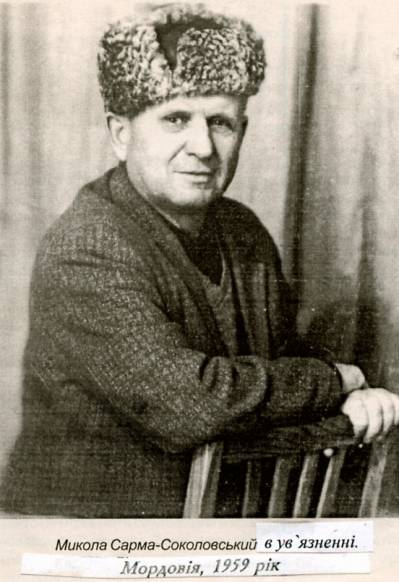YAROSLAV HOMZA. THE POET FROM KHOROSHE (MYKOLA SARMA-SOKOLOVSKY)
Mykola Sarma-Sokolovsky, now over seventy, comes from a clerical family. His great-grandfather was a priest, his grandfather a deacon, and his father and uncle were priests; his uncle was of the Moscow orientation, while his father was of the Ukrainian one. Mykola took up the cross that his father carried.
The poet was born, as he says, “in the former Katerynoslav region, between Petropavlivka and Mezheva, in the village of Khoroshe, which not coincidentally has such a name—it was once truly very beautiful: it graced a hill and the land below it, sanctified by a five-domed church, winged by windmills that flapped their blades like Chumaks with their wide sleeves, reflected on the broad surface of the Samarka River, which is mentioned in a kobzar duma:
У річки Самарки, // у криниці Салтанки, // там усі поля самарські // пожарами погоріли…
Mykola dislikes being addressed by his patronymic, as it is not characteristic of Ukrainians. He is an artist, a poet (he also writes prose), and a bandurist (a master of the bandura). As a priest of the Ukrainian Autocephalous Church and a constant participant in the Ukrainian national movement, he, along with his wife, two brothers, and brother-in-law, was sentenced to twenty-five years each. In reality, this three-digit number, 125, belonged to Mykola alone... But a person’s life is short, and so this term was divided among five people: to his relatives simply for being relatives. The poet attests to his sentence with a laconic verse:
Завжди бунтую – // обширу в рамцях замало... // Моя поразка – теж перемога. // Не раз ставав перед Трибуналом – // стану і перед Богом.
He served his sentence in various camps in the North. In total, including his preliminary detention, it was seventeen years. He remembers USLON, Uslag, Belbaltlag, Intlag, Abez, and Dubrovlag. He never translated the names of the Soviet punitive organs into his native language, just as he did with the purely Russian (and piquant) word, “parasha.”
Mykola escaped twice from a train car, from under guard. In his file, it was written in red pencil: “Extremely dangerous, prone to escape, to be used for general labor.” And so he was used, but not always. What saved him was his ability to draw. He painted in the cultural and educational section, and also fulfilled commissions for the authorities... After his release, he never had peace—the Chekists were always harassing him. However, in 1980, he was lucky enough to publish a collection of poems, “Na osonku lita” (“In the Summer Sun”), at the “Radyanskyi Pysmennyk” publishing house—and it was as if a spell was cast. The appearance of his book greatly angered the Chekists: he published it without their knowledge!
Mykola had many friends, even sworn brothers, who not only respected but also loved him. Of course, for the Chekists—this was like a bone in the throat! And they began to act: first, they sent an informant, and then a newspaperman. A striking article appeared in the regional newspaper “Zorya,” and later—a letter, supposedly written by Mykola himself, but in reality, “composed” on a typewriter in Russian by KGBist Yu. Taraban. In the letter, the poet allegedly condemned his past and renounced his friends, whom the Chekists considered “Ukrainian bourgeois nationalists.” What a lie! However, the already elderly and ill Mykola, exhausted by interrogations and “tactful” threats, was forced to sign what he had not written—a slanderous sentence upon himself. The envelope with the verbal filth was sealed by the investigator of the Novomoskovsk KGB, Major A. Holovko, himself, and, not trusting Mykola, he personally dropped it into a mailbox in the presence of the ostensible author. A few days later, in the newspaper “Zorya,” it appeared in black and white…
Ukrainian periodicals in both Kyiv and Lviv stopped publishing the poems of Mykola Sarma-Sokolovsky, and the exhausted poet—remains under Stalinist-Brezhnevite disfavor to this day. However, despite his advanced age and illnesses, he works persistently: he writes verses, long poems, prose, and paints—mainly portraits of Shevchenko, which he gives as gifts to people worthy of such a present.
Mykola Oleksandrovych does not stand aside from political life. Last year he became a member of the Ukrainian Republican Party, and he joined the ranks of the OUN back in 1941 in Poltava. Among his recent works, the poem-duma “Anathema” should be noted, which in terms of time covers several centuries of our history.
The poetry of Mykola Sarma-Sokolovsky is imbued with thoughts about being, about life, about the suffering that fell to the lot of his generation. However, through the sorrow, a bright hope for something shines through…
(Published in the newspapers “Poklyk Sumlinnya,” Lviv, 1991, No. 25, and “Ukrainske Slovo,” K., 1994, No. 23, as well as in the collection “Zona” No. 1, K., 1992, pp. 110-111; in the book: Yaroslav Homza. Articles, memoirs, poems. “Haidamaka” Publishing House, Ocheretyane, 2002.)
